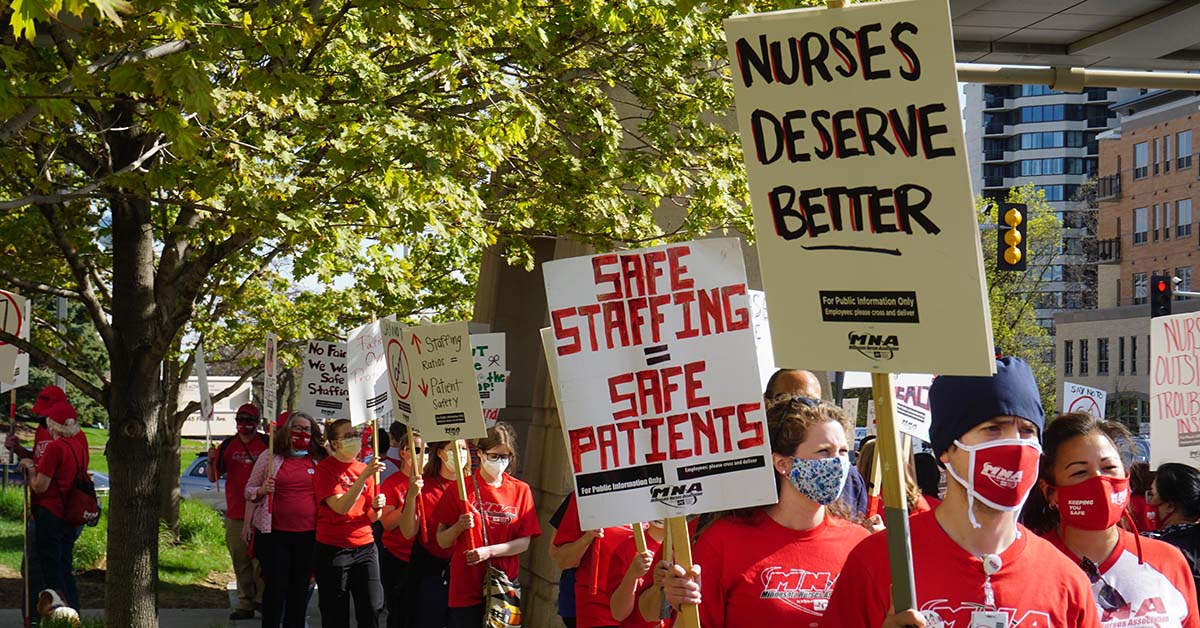The truth about the Twin Cities’ health care bed shortage

By Rui Pina
National Nurse Magazine
July | August | September 2021 Issue
We are witnessing another surge in health care hospital needs. The media is inundated with stories of ICU bed capacity issues with Covid-19 being the usual cause of this situation. However, it fails to shine a light on the responsibility that the corporate-driven health care industry bears. This crisis is greatly self-induced by poor business practices, and profit-driven policies and strategies that have significantly exacerbated the health care worker staffing crisis.
With the onset of Covid-19, health care employers in the Twin Cities instituted “Covid-19 staffing practices” to address years of chronic short staffing and unwillingness to staff appropriately for community needs. Hospitals have traditionally run with minimal staffing and at maximum capacity. ER waits and closures, due to lack of staffing, were not new with Covid-19. Those practices have been in place for several years before Covid-19 happened.
Following last year’s Covid-19 wave, employers decided to continue and to compound such staffing practices by reviewing patient care ratios downwards with the justification that such changes, in order to address efficacy, were necessary to address Covid-19-related financial losses despite being recipients of emergency government Covid-19 funds. In St. Paul, the actual number of patient care beds was significantly diminished with a closure of one hospital and partial closure of another. In addition, one employer has implemented an electronic acuity tool that further contributes to patient assignment concerns. Nurses in the Twin Cities will consistently work full shifts without the ability to take time to eat a meal or take a break. The employer’s response is: “Why don’t you find another nurse (equally overburdened) to take your assignment?”
Despite increasing labor market demand due to fatigue, health care workers leaving the profession, and poor working conditions, most employers have refused to address such issues or increase compensation in order to address demands. Health care benefits for health care workers have been on the decline for several decades and that is especially significant during a pandemic when professional hazards make the need for health care financial security a concern. Health care workers are now faced with the worry that a potential exposure can result in financial ruin. Some organizations have not only failed to recognize this, but have doubled down by refusing financial responsibility and by refusing to pay exposed workers for work-related quarantine time.
Politicians in the Twin Cities, despite words of support for frontline workers, have turned a blind eye to the corporate health care misdeeds. Many, supported individually or collectively by such organizations, seem unwilling to “bite the hand that feeds them,” thus neglecting the duty to represent Minnesotans and their health care needs. As long as state elected officials continue to ignore their duty to address patient ratio concerns, health care delivery and availability will continue to deteriorate in the Twin Cities. Corporate health care’s sole priority is profitability and its drive to benchmark practices with the rest of the country will result in a race to the bottom in delivery of care. Minnesota will lose its renowned leading edge in health care delivery.
As another wave occurs, we are now severely impacted by an overworked, demoralized, and exhausted health care workforce. We are poorly led by corporate leadership who are unable to understand the dynamics of this shortage and their responsibility to its origin. It is easy to miss such development when leadership is remote, occurring in the relative safety of online venues such as Zoom or Microsoft Teams, far away from the bedside and unable to view the impact such decisions have on the very same frontline workers that many leaders claim to greatly honor and appreciate.
Rui Pina is a registered nurse and member of Minnesota Nurses Association.